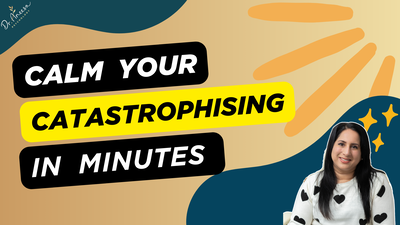
Why You Can’t "Just Relax": Understanding the Anxiety of Being Always On
On the surface, everything looks fine. In fact, it might look better than fine. You’re meeting your deadlines at work or university. You show up for your family. You’re the responsible one, the organiser, the high-achiever. To the outside world, you are coping brilliantly.
But internally, it’s a different story.
Many of the clients I see in my practice—from final-year students facing exams to CEOs managing teams, and even recently retired professionals—share a common, exhausting secret: they have forgotten how to stop. If you find that "downtime" makes you agitated, or that your mind races the moment your head hits the pillow, you are not alone. And more importantly, you are not broken. You are likely stuck in a cycle of high-functioning anxiety.
Read more: Why You Can’t "Just Relax": Understanding the Anxiety of Being Always On

Beneath the Cap and Gown: The Hidden Struggles of University Life
We are often reminded by our elders to cherish our university days, described as "the best years of our lives." The freedom, opportunities, and memorable moments - from academic achievements to nights out with friends — can certainly make this sentiment feel true. For some, these years will indeed be treasured as a time of joy, growth, and connection. However, for many students, the reality is more forlorn. The enjoyment of university life can often be overshadowed by the pressure to succeed academically or to maintain a thriving social life. The relentless pursuit of achievement that universities push onto its students under the guise of self fulfilment. Often this gives rise to feelings of inadequacy, self-doubt, and ultimately, anxiety.
Read more: Beneath the Cap and Gown: The Hidden Anxiety Struggles of University Life

Imposter Syndrome: When Success Doesn't Silence Your Inner Critic
You've made it. By all outward appearances, you're living the dream. The luxury car, the dream house, awards and recognition – you've ticked all the boxes of "success." Yet, a nagging voice whispers, "You're a fraud. Any minute now, they'll find you out." This, my friend, is imposter syndrome, and it doesn't care about your bank account or objective indicators of success. In fact, for many high-achieving individuals in their 30s and 40s, especially those who've attained significant wealth, it can be a particularly confusing burden, weighing you down mentally and causing you to constantly question yourself. You may even feel a sense of dread, wondering when it will all fall apart, leaving you unable to enjoy what you've worked so hard to achieve. If this sounds like you, you're not alone. Keep reading to find out more and learn some helpful coping strategies...
Read more: Imposter Syndrome: When Success Doesn't Silence Your Inner Critic

Calm Your Catastrophising in Minutes
You are really good at getting in your head about things and imagining worst case scenarios. You find it impossible to stop or control your worrying, especially about the future. Little niggles hook you in quickly, causing you to spiral with worry about all the things that could possibly go wrong or how you will fail. You can see these worst case scenarios clearly in your mind and this then leads you to start feeling panicky, tense, you might even have a racing heart beat. You are consumed with these fears and feel helpless to control or stop engaging with your worries. If you are quick to catastrophise and tired of feeling distracted by all the worst case scenarios, which are sucking the joy out of your life as it is now, then keep reading for some helpful insights.

Silent Night, Silent Mind: Navigating Social Media Anxiety at Christmas
Have you been scrolling Instagram or tiktok and feeling like you haven’t been organised enough? Your house isn’t looking festive enough? You haven’t done enough Christmas baking or got your lights up yet? Is the constant barrage of social media content making you feel stressed, inadequate, and like you are not measuring up to the perfect holiday aesthetic? If you notice your anxiety levels rising at this time of year, keep reading to learn more about how social media can be toxic for breeding worry and self doubt and what you can do about it.
Read more: Silent Night, Silent Mind: Navigating Social Media Anxiety at Christmas

Autumn Burnout: How High Performers Can Achieve Balance
Autumn is a season of change, and is often a time when the pace at work increases following a slower summer period of school holidays. For many high-performing professionals, this transition can lead to a sense of burnout as you transition out of the slower summer days and holiday mode to going back to all hands on deck in the run up to the Christmas period. The pressure to excel and meet year end deadlines, coupled with the change in weather can take its toll on your mental and physical health.
Read more: Autumn Burnout: How High Performers Can Achieve Balance instead of Stress

Why CBT Didn't Work For You Before: A Psychologist Explains
Cognitive Behavioral Therapy (CBT) has gained significant recognition as a scientifically supported talking therapy treatment for anxiety, trauma, and many other mental health conditions. However, the effectiveness of CBT hinges on appropriate specialist training, strong therapeutic skills, and most importantly, the quality of the therapeutic relationship. When done right, CBT can be a fantastic therapy option for individuals seeking to better cope with many forms of anxiety. Let's explore why CBT done right is crucial for achieving positive outcomes.
Read more: Why CBT Hasn't Worked For You: A Psychologist Explains

The Reassurance Trap: The Tricks OCD Plays on Us
You're out driving to work when you drive over a pothole. You feel the bump underneath the car as you drive over it. A moment later, as you continue driving, doubt creeps in and you have the horrifying thought of "what if I ran over someone?". You try to reason with this doubt for a few moments as you continue driving, but the worry grows louder, causing you to wonder if you have run over someone and missed it. You begin to imagine someone lying in the road, and have visions of the police knocking on your door to arrest you hours later. You are now feeling panicky, heart is pounding, palms are sweaty, and you are convinced that you have run someone over and are a horrible person.
You turn the car around and drive back to the scene, getting out of the car to carefully examine the road. Problem solved right? No! Because the more closely you examine the scene, the more you start to doubt your own perceptions. Highly anxious and panicked, you take a video of the road and send it on whats app to your spouse, who quickly reassures you that there is in fact only a pothole there. You breathe a sigh of relief, feeling calmer instantly, and get back in your car to continue driving to work.
If you have ever struggled with trusting your own judgement and felt plagued with doubt and anxiety in these types of situations, read on!

Chasing Dreams Without Burning Out: How Mindfulness Can Help with Anxiety and Stress
The hustle is real. In today's world, ambitious professionals are constantly pushing themselves to achieve bigger, bolder goals. But let's be honest, that relentless drive can take a toll. Anxiety creeps in, the to-do list becomes a monster, and before you know it, burnout is knocking on your door.
What if I told you there's a way to navigate the ambitious path without sacrificing your well-being and burning out? Enter mindfulness. It's not some woo-woo trend, but a powerful science backed practice that can transform how you approach your career and your life.
Read more: Chasing Dreams Without Burning Out: How Mindfulness Can Help with Anxiety and Stress

Do I Really Need a Psychologist for my Anxiety? How to Choose the Right Mental Health Professional
Hypnotherapist. Counsellor. Coach. Psychotherapist. Psychologist. And all the rest with different titles. It can be overwhelming to know who to choose to help you with your anxiety when there is so much choice. What is the difference anyway? And why should you choose a licensed psychologist when they charge higher fees? Therapy is expensive! Maybe a life coach or a parenting ‘expert’ would be better. Who qualifies these people as ‘experts’ anyway? It’s a sea of options, and when you are already feeling overwhelmed with anxiety, it can be even more anxiety inducing to try to sift through to find the right person. Keep reading to find out some top tips and reasons to help you decide!

A Psychologist Explains: How Menopause Can Trigger Anxiety & How CBT Can Help
Let's talk about menopause, a topic that often gets reduced to hot flashes and mood swings. But there's another unwelcome guest at the menopause party: anxiety. It's a sneaky one, showing up as racing heartbeats, intrusive thoughts, and that general feeling of being on edge. And guess what? You're not alone. Anxiety during menopause is incredibly common, but unfortunately not well acknowledged by many doctors. If you’re tired of being fobbed off by your GP about all the ways menopause may be affecting your mental health, then keep reading!
Read more: A Psychologist Explains: How Menopause Can Trigger Anxiety & How CBT Can Help
More Articles …
Page 1 of 3
Testimonials

“I have been able to regain confidence to face colleagues and patients, friends and family. The sessions were really helpful as it helped me to manage my stress, overthinking, confidence issues, social anxiety. These sessions help me to stay grounded. Ms. Aneesa was my life line back to work”

“Emotions were validated and listened to. Having another perspective was really useful for me. Aneesa listened and prompted questions- although uncomfortable- that made me stop and re think and gave me more insight. I hope you realise how much progress I made with your help”

“Of all the different therapy services I have tried through my GP or work, working with Aneesa has singularly been the most beneficial in helping me to recover”

“I am no longer at the mercy of my anxiety and have learnt techniques to control my stress levels at work. I have told all my junior doctor colleagues about the service”
![]()














